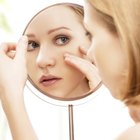
David De Lossy/Photodisc/Getty Images
Cosmetic creams may decrease the appearance of skin damage, including wrinkles, changes in skin pigmentation and surface appearance and feel. Cosmetic creams and lotions containing either copper peptide or vitamin C have biological function in the cells of the skin. The U.S. Food and Drug Administration does not regulate cosmetics except for ingredients that may pose a safety risk.
Vitamin C
Vitamin C, also known as ascorbic acid, acts as an antioxidant when applied to the skin. According to MayoClinic.com, creams containing at least 10 percent vitamin C in the L-ascorbic acid form, with a pH of 2.5 or lower, improve the quality of collagen.
Copper Peptides
Copper is a mineral that is attached to peptides to promote absorption. According to "Dermatology Nursing," copper peptides enhance wound healing and copper is needed to make new collagen and elastin that support the dermis layer of the skin. According to a study reported In the October 2003 issue of "Journal of Drugs in Dermatology," copper peptides firm the skin through enzyme action and help to protect skin from free-radical damage.
Interaction Between Copper and Vitamin C
The normal process of breakdown of ascorbic acid in solutions resulting in active and inactive metabolites. In the July 1994 issue of “Journal of the American Dietetic Association,” researchers point out that copper acts as an oxidant to increase the rate of breakdown to the inactive form, diketogulonic acid.
Skin Repair
Ultraviolet rays and aging cause elastic tissue in the skin to break down, according to a study reported in the "Journal of Drugs in Dermatology". In addition, 1 percent of collagen in the skin is lost each year. Both vitamin C and copper peptides promote collagen production. To prevent interaction between copper peptides and vitamin C, MayoClinic.com recommends using them on alternate days. In addition, the authors point to a study showing copper peptides were more potent than vitamin C on improving collagen production.
Related Articles

Elastin Supplements

What Foods Provide Calcium D-Glucarate?

Copper Peptides Side Effects

Active Ingredients in Face Creams

What Is Palmitoyl Oligopeptide?

The Role of Collagen & Melanin in Skin

Problems With Nose Piercings

What Vitamins Help the Liver?

Can You Decrease Sebum With Vitamin A?

Can Age Spots Be Reversed?

Skin Care Products That Contain ...

Do Eggs Make Baked Goods Rise?

How to Reduce Acne Inflammation

How to Keep Intimacy Alive in a ...

How to Adjust a Movado Watch

Zinc & Copper for Aging Skin

The Effects of Vitamin-D Deficiency on ...

Collagen & Rosacea

Nutrition Information on Blueberries

The Best Vitamins for Sinuses
References
- Mayo Clinic: Wrinkle Creams: Your Guide to Younger Looking Skin
- “Dermatology Nursing”; Helping Patients Choose New Topical Treatments for Aging Skin; ;Diana Gorgos; February 2003
- “Journal of Drugs in Dermatology”: Cosmeceuticals Their Role in Dermatology Practice; Neil S Sadick MD; October 2003
- “Journal of the American Dietetic Association”; Copper Decreases Ascorbic Acid Stability in Total Parenteral Nutrition Solutions: JC Burge, L Flancbaum and B Holcombe; July 1994
Writer Bio
A professional writer since 2001, Lyn Michaud has been published in educational encyclopedias, including "Encyclopedia of Global Health" and "Encyclopedia of Global Warming and Climate Change." She holds degrees in biology and chemistry and spent three years as a board member for Weld City Board of Health.
Photo Credits
David De Lossy/Photodisc/Getty Images